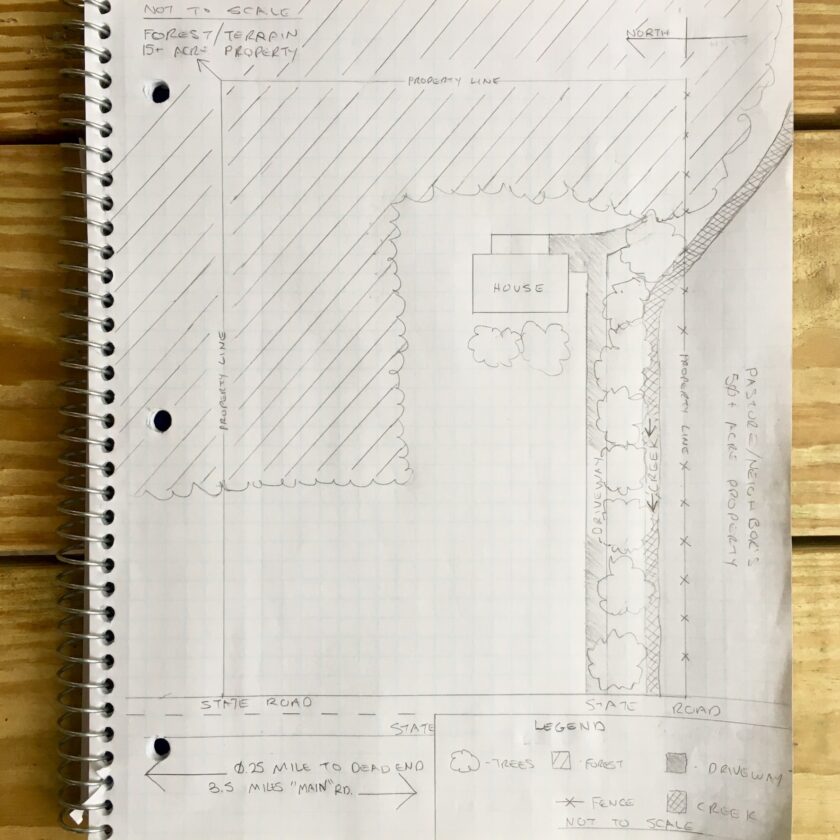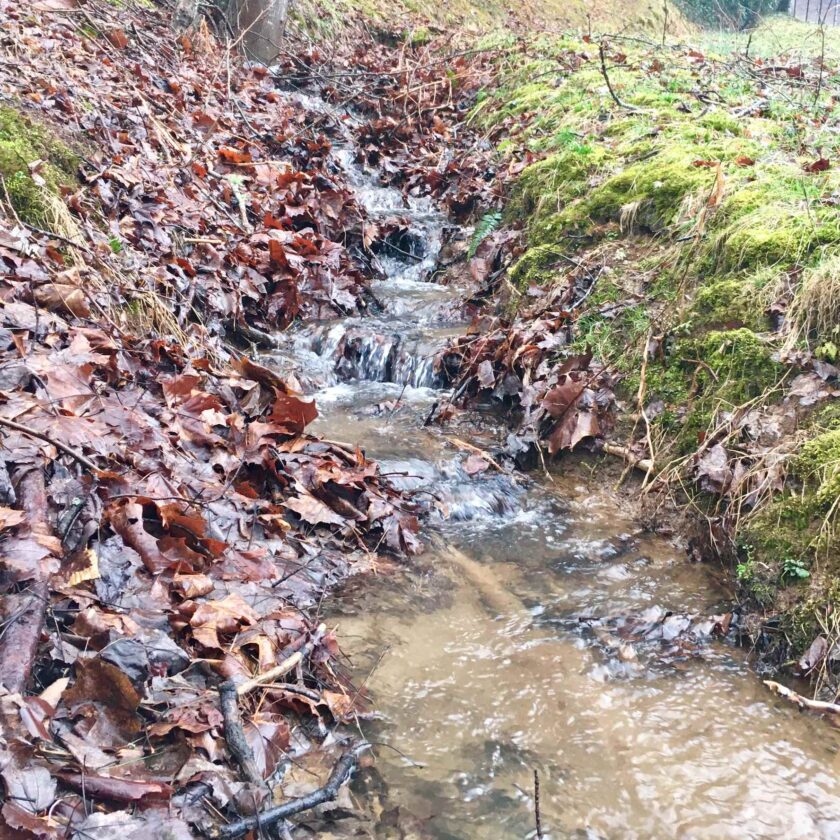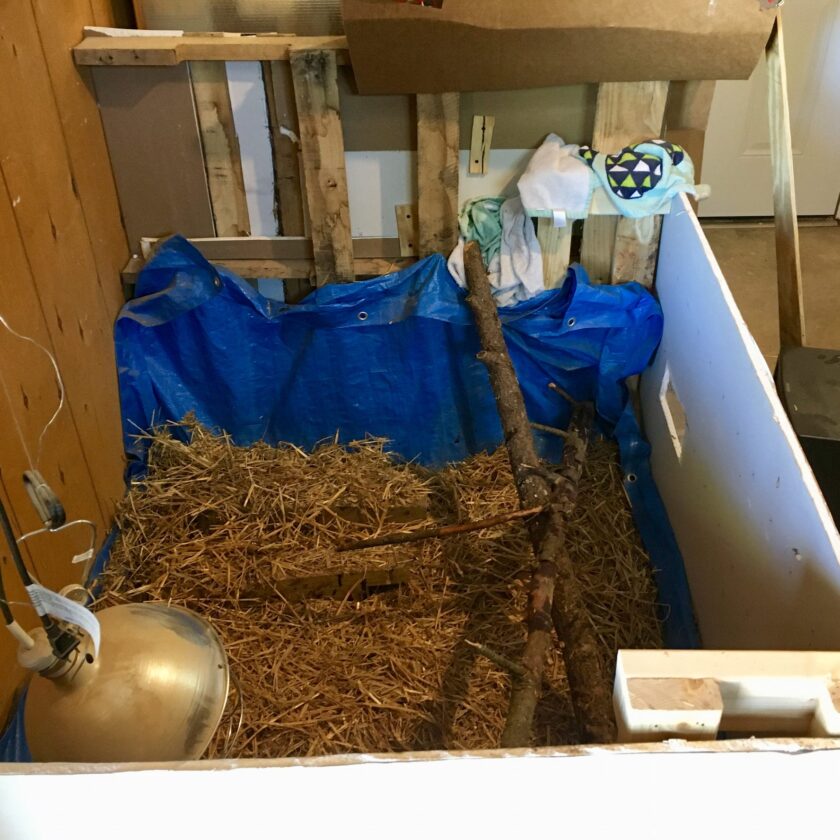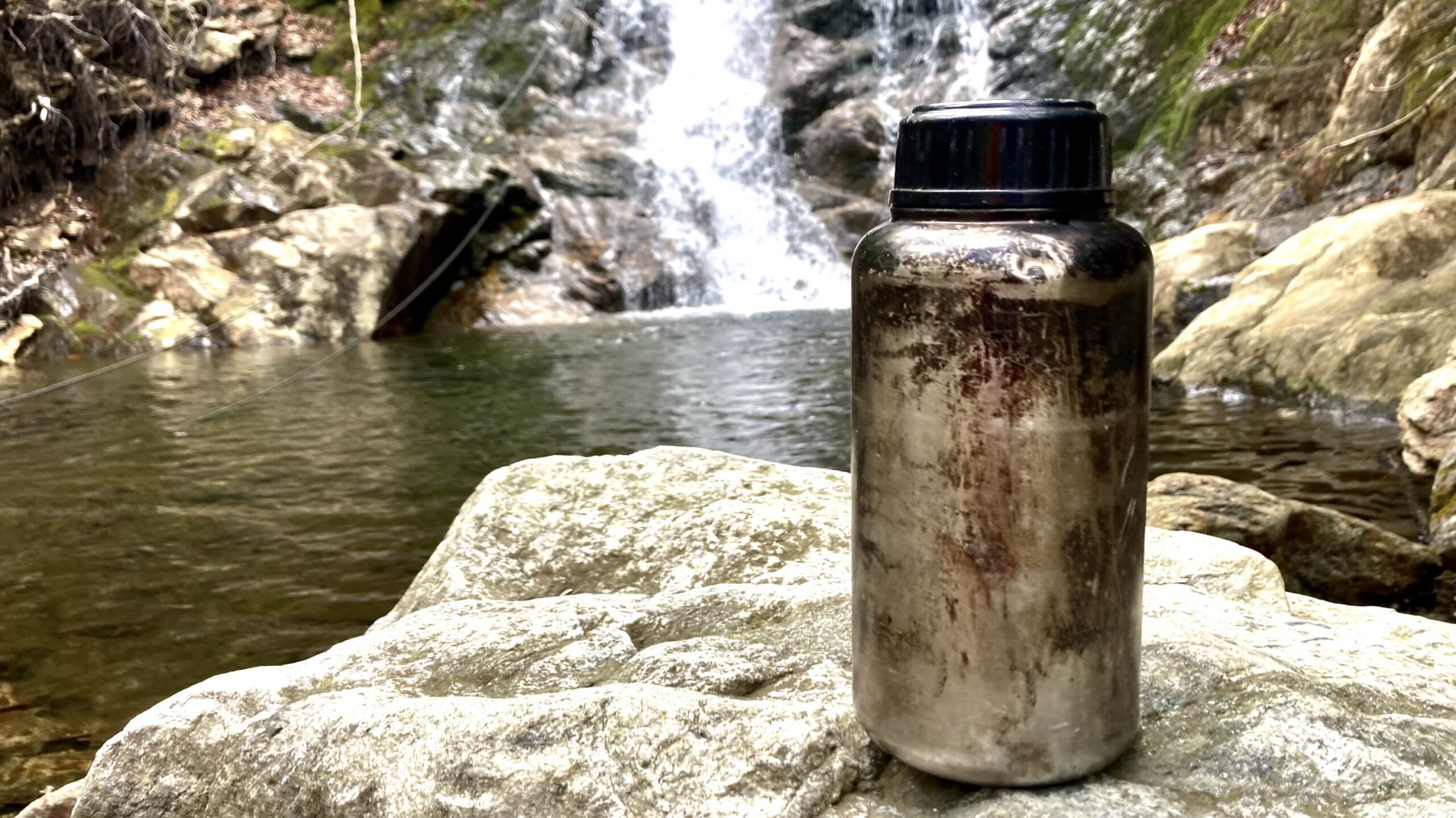I recently received a reader email interested in my homesteading project. He asked quite a few questions, and I am going to address several of them here. Expect to see some more articles on homestead planning considerations, as well as some progress reports from me in the near future.
Home Buying
Purchasing a home is weird. I wouldn’t marry someone I had been on one date with, but we make base the biggest financial decision of our lives on a single walk-through of a house. In our case, we purchased our home from a distance which put even more pressure on the process. We spent double-digit hours driving out here, had a blitz, three-day weekend of looking at houses, and made an offer before driving back home. We didn’t see “our” house again until six weeks later when we owned it.
Greatly helping this process were two things. First, having a list of three things: non-negotiables, like-to-haves, and don’t-wants. We knew what we wanted, what would be cool if we could get it, and what we didn’t want. That doesn’t answer all of the variables but it did help us quickly rule out properties that weren’t going to work for us. Second, having an awesome realtor helped immensely. We got super lucky, but don’t be afraid to fire a realtor if he or she doesn’t live up to your expectations.
Also realize that my list will not be your list. Buying a home is super complicated. It is made even more complicated when you start adding in factors that pertain to preparedness/homesteading/hobby farming/farming/ranching/etc. What follows in this article are considerations that were important to us. You may require pasture or much greater/better farmland, or established fruit trees…or whatever. There’s a lot of potential variation.
We met most, but not all, of the criteria listed below. These are the considerations that were important to use as we searched for our new home. Some of these may not matter at all, and I may have missed others that matter to you a great deal.
Cost
Cost was absolutely one of the most important factors in our decision of where to live. It should be for you, too. We weren’t simply looking for a change of scenery. We also wanted additional freedom, and one of those freedoms was freedom from our employers. We didn’t want to be so dependent on a paycheck that we were forever locked into a job, or that we couldn’t make a principled stand against our employers if they did something at odds with our morals and values.
Up-Front Cost: Regardless of whether you’re paying cash or financing, sale price (and interest, if applicable) should be one of your foremost considerations. We saved a sizable down-payment for this property but ultimately we borrowed money. When getting loan pre-approvals we were “authorized” to borrow over twice the amount we asked for. Don’t fall for it. Our house is a very modest, 1,100 square foot ranch. Our land is pretty modest, too, by the standards of the area. But guess what? We can easily pay all the bills on just one of our incomes, leaving us money for other things. We are pretty resilient in that regard; don’t make yourself house-poor.
Tax Value: Unfortunately you will never truly ever own your home. No matter how much you paid for it or how long you’ve owned it you will still have to rent it back from the government in the form of property taxes (if you don’t agree with me, stop paying your property taxes). The more you spend on a home, the higher (generally speaking) its tax value will be, and this number will increase throughout your lifetime. If you’re willing to move states (we were; we made a very drastic move, distance-wise) you would be wise to consider a state with low taxes.
Upkeep Costs: It is very easy to overlook things like the condition of the roof when you find that house that checks all of your boxes, but keep these things in mind. Having to spend tens of thousands of dollars just a year or two after you move in is going to seriously alter your plans. Some things to keep an eye on are the age of the roof, are major repairs (i.e. foundation repairs) due, etc.

We wanted to assume the minimal debt and ongoing costs possible while still meeting most of our goals. It made no sense to move only to be so broke that we couldn’t afford the money or time to carry out any of our plans. That’s why we ended up on a sub-two-acre plot rather than the four-plus acres I would have hoped for. I’m very happy with our decision. Get this: our mortgage is around $500 less than what we paid in rent on a single-bedroom apartment.
Property Size & Land Use(s)
Our second biggest criteria (and a non-negotiable) was the size of the property and ability to use it in the way we wanted to use it. While I would love to have ten acres or more, it simply wasn’t within our budget. Actually, I think four acres would have been about ideal for us and our ability to work the property without massive expenses in equipment. We ended up somewhere between our minimum and upper goals at slightly under two acres. You can make two acres be extremely productive if you’re willing. Our land is never going to be completely self-sufficient but it’s massively closer than we were in a 750-square foot apartment.
The other non-negotiable was the land had to be workable. While we’re cool with being in the mountains, all of our land on a grade wouldn’t have worked for us. Though we wanted to be near the forest, having all of our land forested or in shade would have made it unusable. Our goals were to be able to garden, raise some livestock (mostly chickens), and maybe grow a fruit tree or two. On the other hand, we also wanted some wooded land. We wanted some woods for various reasons, not the least of which was to have decent reserve of standing firewood.
Water & Sewage
Water was next. Though we probably should have been more firm, we were willing to compromise on water. Now that I have it and am used to having it, my views have changed. If we ever move water will be a hard non-negotiable. The water we have isn’t ideal; it’s small and it flows through the neighbor’s pasture, which means it is almost certainly contaminated with all manner of pathogens. Between boiling and the Berkey we can still make good use of it. And honestly, the size is kind of irrelevant for water collection because it still produces tens of gallons per minute.

In the future (say, next two years?) installing a rainwater catchment system is a major priority to make us less reliant on the creek alone. Which brings me to another point: the desert, while not without its charms, was not an option for us. A general requirement was a locale that is not reliant on piping water in from another, completely different geographical area. I believe you will be much more resilient if you are in an area that, under normal conditions, receives adequate rainfall/snowfall to meet its water demands.
We are well outside the boundaries for city water and sewer. We have a well and a septic system, which is as I would prefer it be. It comes with a little more liability (if it breaks, you fix it), but I don’t want to be on city utilities.
Privacy of the Property
After coming from a tiny, ground-floor apartment, we were ready for some privacy. At the apartment we had people literally walking within 10 feet of our patio door, day and night. When I say “privacy” I don’t mean we wanted to be in the geographic center of Nowhere. We still desired neighbors and accessibility to larger towns/cities. However, we wanted to be able to sit in our back yard and not be seen by the neighbors. I wanted to be able to dry practice outdoors, or load a rifle case in my car unobserved. We wanted to be able to unload our groceries without the neighbors being able to do an accounting of what we purchased.
Finding a property like this was harder than we imagined. We looked at at least two properties that had a shared driveway. That would have meant vehicles driving down our driveway to houses further down. Unacceptable. One thing that wasn’t on our radar until we’d already purchased was the potential for right-of-way issues. Fortunately it’s not an issue for us, but do your best to ensure that someone else doesn’t have right-of-way through your property.
Another factor was traffic volume on our road. This was a concern for reasons other than privacy, like noise and safety. Fortunately, our property is less than a quarter-mile from the dead end. There are maybe a dozen cars that we see on a regular basis, and we regularly go for several hours without seeing or hearing any cars.
A final factor here – and one that is largely out of your control unless you own a massive amount of land around your homestead – is potential for development around you. You’ll want to keep an eye out for spots that may be built in the future. Though you can’t perfectly predict it, you may also want to try to predict the creep of McDonald’s and Walmart and the flow of highways. Does “your” road make sense as a future connector of two major avenues of approach? Is it poised for growth/widening because it is a corridor between two towns, or two areas (i.e. residential and retail) of a town?
Compromises: You aren’t going to get it all, and this was something we compromised on slightly. Our biggest compromise is that our open land borders the road. On one hand it’s not ideal because people can see our garden beds and chickens, and whatever else we do in the front. On the other hand, almost all of our neighbors have far more livestock and garden space than we do, so we’re not the outliers we would be in many places. Also, by working out near the road we get a lot of facetime with our neighbors, many of whom walk by or drive by on UTVs, and a couple who ride by on horseback.
A note on “city” vs. “country” privacy: Something that has come up twice from my city-dwelling friends is the idea that you are more private in a city than in the country. They claim that in the country there is lower population density and fewer people to watch. In the country everyone knows everyone, while in a city everyone is anonymous. I don’t concur. I have lived in the city proper of two of the 20 largest cities in the country. I have lived in suburbs of those and other cities. I have also lived in a couple extremely remote locations. Honestly, there’s just not much difference.
Sure – in the city you’re closer to “anonymous” (though even in the biggest of cities you will occasionally run into someone you know), but in your apartment building or condo complex? Everyone sees you come and go. Everyone keeps track of the fact that your blinds haven’t opened in three days, or that you put a new plant on your windowsill, that you just bought new furniture, or what is the huge package on your doorstep? Everyone knows who fights with their spouse, who has kids, who watches TV all night… you get the idea.
Proximity To…
As I mentioned earlier, our intent wasn’t to go 100% off-the-grid/mountain man/farmer. That might be your intent and if it is, finding your property will be much easier. Our intent was to have more privacy, in a less stressful location, and creating a more resilient state of being than relying 100% on an inherently unstable supply chain. To be honest, I believe we’ve gotten a bit more hardcore since being here but some “normal” activities are also extremely important to us (or were, before COVID shut everything down). Your requirements might be very different, but we wanted to proximity to:
Airport: Both of us travel for work (me more frequently than her). We also travel for leisure and didn’t want lack of travel options to be a huge factor in slowing that down. We required reasonable access (within 1 hour) to a halfway decent airport. Not an ATL or LAX or ORD…but also not a Bar Harbor, ME where you have to load your own bags. Maybe something the size of Manchester, NH or Bozeman, MT – big enough to reliably get you out to a connection, on time, most of the time, or maybe even fly you direct within the region.
Culture: We wanted to be within an hour of a decent-sized town. Some of you gun-guy-types may not like this at all, but we enjoy live music and festivals and art. As complex, multi-faceted humans we like getting dressed up and going to a nice restaurant or a fancy cocktail bar occasionally. We like meeting new people and having access to a variety of events. We wanted to put ourselves within an hour or so of a city of around 100,000 people (give or take). Keep in mind that this also places you within good proximity of better hospitals and the like. That might not sound like a big deal until you actually need a Level I trauma center, or your wife is delivering a baby in a clinic more accustomed to treating the broken bones of ski bums.
Jobs: This wasn’t a huge factor for us, but it might well be for you. My girlfriend kept her job and works remotely, with a quarterly, in-person check-in back at the office. My job has been mostly travel-based for several years so there is little change there. This may be a huge factor for you or your family. If you are in an extremely niche career it may severely limit your list of possible locations (and honestly, I would recommend you move into something more adaptable…but that’s just me).
Family: Again, this wasn’t a huge consideration for us. If you’ve read frequently you know that I live fairly close to my sister and brother-in-law. This was purely coincidental, but if I were doing it again, this might be a priority. Thought our efforts to engender good relations with our neighbors have largely succeeded (a follow-up on that is due) family is still who we call when we need something. Family is still who we drop everything to help. “Family” doesn’t have to mean blood kin. Family, in this context could be a strong contingent of friends, as well, but it should mean people that you would trust and help, and who would help and trust you.
Disaster Risk
We strongly factored disaster risk into choosing our area of the country. Mitigating some disasters are easy. You don’t really have to worry about hurricanes or tsunamis if you live inland. You don’t much have to worry about flooding if you live on sufficiently elevated terrain. You can greatly reduce your risk of being affected by a terrorist event by being outside of a dense population of humans.
Mitigating other disasters are hard. Any place in the country could suffer a drought. Wildfires could strike nearly any area of the country, drought or not. Nuclear facilities – that have the potential for accidents – are littered throughout the country and it’s difficult to be away from all of them. There probably is no “perfect” place to live, but you should consider what risks you’re willing to tolerate.
Security
It may seem odd for a guy that writes about security to list security near last. There are a couple of reasons. First, you can increase the security of nearly any house. It’s not that difficult and it’s usually not insanely expensive. I also list “defensibility of terrain,” which you can’t easily modify. However, needing to defend one’s terrain – while possible – is very low likelihood and I’m not going to make it a major factor in my decision.
Security of the House: We definitely made a couple of compromises here. First, putting yourself in a remote location does not equal security. There are simply fewer people to see someone breaking into your home or to hear a commotion. Second, there aren’t many streetlights out where we live. I know the self-defense crowd has latched on to the gospel that “it’s never really dark,” but they’ve never been to my house. It gets fucking dark. I don’t really want to change that but it’s something to keep in mind.
There were a couple other, small compromises I made regarding security. I’m not going to list them here but I will point out a few structural security issues you should be on the lookout for.
- French doors or sliding-glass doors: I am not a fan. It is simply impossible to make them as secure as a single door, and replacing them is difficult and expensive.
- Very large windows: I get it – those huge bay windows are lovely but they are a massive security risk. The larger and more abundant your windows, the harder they are to secure. On the other hand windows also make it easier to cool your home naturally in the summer.
- Garage doors: a larger opening is harder to secure than a smaller opening. Also, garage doors may not seal well, allowing mice and other vermin in.
Pretty much everything else can be fairly easily and (relatively) inexpensively fixed. Single, personnel doors can be changed, locks can be changed, lights and cameras can be installed, etc.
Defensibility of the Terrain: This wasn’t a huge factor, but it was something that came to mind. In fact, general vulnerability of terrain came to mind as we looked at one property that sat directly below a curve in a fairly high-speed road. No thank you. Our property sits in a draw. The house is on the eastern ridge, and the western ridge is across the road, with the road being the bottom of the draw. I have about 30′ of elevation above the road, and I’m maybe 100′ below the crest of the finger we sit on; not quite on the military crest, but not far off, either. Now, I’m vulnerable to anything coming from the east, but there’s nothing in that direction but tens of miles of forest. Is it perfect? No. Is it better than a 750-square foot apartment inside a major U.S. city?
House Considerations
It may also seem odd that – when discussing where to live – the house itself is near the bottom of the list of considerations. It’s not that it wasn’t unimportant, but it’s much easier to improve a house than it is to majorly alter land. There were only a few considerations that we had in regards to the house.
- Basement or cellar: having a basement is awesome. It’s a little musty and it gets a little damp when it’s rainy but man, is it awesome. We have a dedicated workshop area, a cool, dry, dark area for storing potatoes and onions, a safe dry practice space, plenty of room (and appropriate temperatures in winter) to lager beer, space to set up our brooder to raise chicks… The list could go on and on. The basement also gives us a fairly secure location in the event of the rare tornado or whatnot, and, should we need it, a much cooler place to sleep during the summer months.
- Screened-in porch: we like the porch for all the obvious, normal-person reasons. It being screened in also lets us open the back and front doors in summer to create a nice flow of air through the main part of the house. Our screened-in porch would also function as our outdoor kitchen should we have to move to cooking on propane stoves.
- Floor plan conducive to wood heat: Many modern floorplans that prioritize separate rooms are not great for a central source of heat. Admittedly this was a tertiary consideration, but our floor plan consists of a large, central space (living room, kitchen, dining room) with a master bedroom on one side and a hallway leading to a bath and two other bedrooms of the other. Check.
- Positioned to take advantage of passive heating/cooling: This can be summed up as surrounded by deciduous trees that offer shade in the summer but allow sun in the winter.

There are a million other criteria you could apply to something as complex as a house. Those are a few of the preparedness/homesteading-specific criteria that we looked for.
Other Considerations: Neighbors
There is just one more consideration here: your neighbors. Nothing is going to be guarantee that your neighbors will like you or that you will like them. And it would probably take a lot for a single neighbor to dissuade me from purchasing a home. This is definitely something we were aware of when looking at properties. Were the neighbors amenable to a rooster crowing first thing? This is probably going to be evidenced by the presence of chickens and other livestock. Is the neighbor’s yard a mini-junkyard? Not that outward appearances say everything about a person, but do you want to look at a mini-junkyard all day? On the other hand, do all the neighbors have golf-course grass? If so, we would definitely stand out with our raised beds, straw-bale gardening, chickens, and somewhat flexible yard care regime (we certainly meed the definition of “yard,” not “lawn”).
Parting Shot
This is just one man’s thoughts on what was important in looking for a homestead location. I’ll be back soon with an update of all the improvements we’ve made. Stay tuned!




